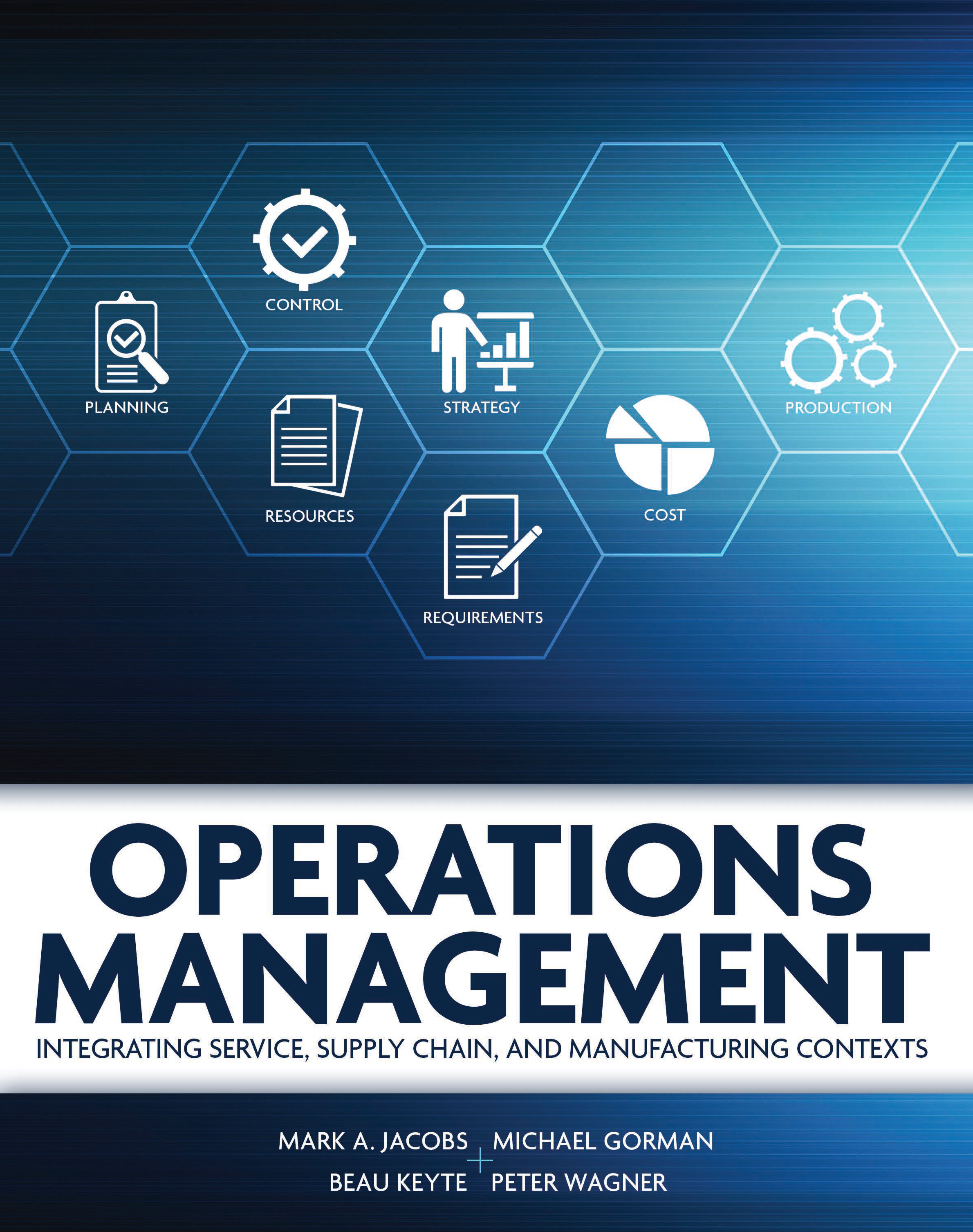Operations Management: Integrating Service, Supply Chain, and Manufacturing Contexts
Author(s): MARK JACOBS , BEAU KEYTE , Michael F. Gorman , Peter G Wagner
Edition: 1
Copyright: 2024
Pages: approx 450
Edition: 1
Copyright: 2024
Pages: 584
Choose Your Platform | Help Me Choose
$105.00 USD
Operations Management is structured as follows: subject matter content is first, followed by integrative scenarios, and finally appendices containing details of methodology and techniques.
The content chapters are scenario-driven. Each chapter covers an operations topic from the perspective of the non-OPS student. For example, the short-term scheduling chapter follows a mortgage underwriter as she navigates aspects of scheduling work such as: including scheduling adaptations to address both internal and external demand variation; work sequencing options; and identifying methods of scheduling with applicable rules. After the content chapters there are several integrative scenarios. Each scenario uses principles from a few of the chapters. The interdependence of OPS and other functions and operational issues become apparent through discussion of the issues in these scenarios. Further, these scenarios will help students see that there can be multiple ways to solve problems and show that OPS is integral to the organization, and that the thinking processes required of OPS managers is critical for organizational success. The book closes with appendices that describes various techniques and explains the math; for example, CPM diagram, SPC, etc.
Specific and unique aspects of Operations Management include:
- a spotlight on the integration with other functions, which helps the non-OPS major see how OPS principles apply to their discipline and daily professional life
- focus on problem solving—in particular business problems where OPS principles are valuable rather than OPS problems where we can apply formulas
- concise chapters that target topics that are applicable and relevant for today and tomorrow, including lean applications in a service environment
- a practical, pragmatic, and useful approach that serves students in their careers
DEDICATION
PREFACE
ABOUT THE AUTHORS
CHAPTER 1 Operations and the Supply Chain
CHAPTER 2 Operations Strategy
CHAPTER 3 Service Operations
CHAPTER 4 Quality Management
CHAPTER 5 Supply Chain
CHAPTER 6 Procurement and Sourcing
CHAPTER 7 Logistics and Distribution
CHAPTER 8 Location Decisions
CHAPTER 9 Process Design
CHAPTER 10 Lean Systems
CHAPTER 11 Theory of Constraints
CHAPTER 12 Capacity Planning and Management
CHAPTER 13 Materials and Resource Planning
CHAPTER 14 Inventory Management
CHAPTER 15 Short-Term Scheduling
CHAPTER 16 Project Management
CHAPTER 17 Change Management
CHAPTER 18 Data-Driven Operations
CHAPTER 19 Sustainability
CHAPTER 20 Performance Measurement and Management
INTEGRATIVE SCENARIO 1 Folson’s Wholesale Specialty Custom Coffees
INTEGRATIVE SCENARIO 2 Go Waco! Ltd
INTEGRATIVE SCENARIO 3 Insurance Company Legal Services
INTEGRATIVE SCENARIO 4 Temporary Clinical Care Staffing Agency
CASE STUDY The Collapse of the Strategic National Stockpile
APPENDIX A Quality Tools Appendix
APPENDIX B Value Stream Mapping
APPENDIX C Process Mapping
APPENDIX D Forecasting
APPENDIX E Materials Requirements Planning (MRP)
APPENDIX F Optimization Appendix
APPENDIX G Deeper Thinking on Lean
APPENDIX H Project Planning and Scheduling
GLOSSARY
INDEX
- Discussion Prompts
- Powerpoint
- Test Bank
Dr. Jacobs is Professor of Operations and Supply Management at the University of Dayton where he teaches graduate and undergraduate courses. He has also held positions at Michigan State University, Ohio State University, and Alto University in Finland. He has published numerous influential articles on the topics of product and portfolio complexity, modularity, and supply chain integration in the leading journals of the field. Prior to an academic career and over a span of 15 years, Dr. Jacobs held a variety of positions of increasing responsibility in the professional services industry beginning as an Industrial Engineer at IBM and culminating as Chief Operating Officer at JL Analytical Services. His Ph.D. in Operations and Sourcing Management is from Michigan State University.
Beau Keyte is president of Keyte Group, a process improvement consultancy. He has spent over 30 years challenging organizations in systems thinking, from manufacturing floor and supply chains to financial institutions and large integrated healthcare systems. He has authored two award-winning books on applying lean techniques to offices, services, and healthcare. He is on the faculty of the Lean Enterprise Institute, a founding Faculty Fellow at the Shingo Institute, and an Adjunct Professor at the University of Dayton. Prior experience includes positions at Sun Shipbuilding, Booz, Allen & Hamilton, and Coopers & Lybrand (Price Waterhouse Coopers).
Dr. Gorman is the Niehaus Professor of Operations and Analytics at the University of Dayton where he teaches a wide variety of courses. He has published widely on operations improvement technologies and strategies, in journals such as the INFORMS Journal on Applied Analytics, Manufacturing and Services Operations Management, and International Journal of Production Economics. Prior to his 20-year academic career, Dr. Gorman held a variety of positions over a 10-year span at the Santa Fe and BNSF Railways, where he rose to a position as the Director of Operations Research.. He continues to consult with a variety of clients on analytics and operational improvement. He has a PhD. in Business and Economics from Indiana University.
Peter Wagner is Principal Lecturer and Teaching Fellow at University of Dayton, Dayton, Ohio, where he teaches Operations Management, Business Statistics, and Business Analytics courses at the undergraduate and graduate levels. While at the University, he has provided consulting services in analytics for a large company with operations in over 100 countries. As Director of Study Abroad Programs for the University’s School of Business Administration, Peter organized international study abroad programs for about 100 faculty and over 1000 undergraduate and graduate students. Prior to joining University of Dayton, and after a career in the US Air Force with increasingly senior leadership responsibilities involving all aspects of logistics management, Peter also gained private sector management experience with three companies. Peter holds the academic degree of Master of Science in Systems Management/Logistics, University of Southern California.
Operations Management is structured as follows: subject matter content is first, followed by integrative scenarios, and finally appendices containing details of methodology and techniques.
The content chapters are scenario-driven. Each chapter covers an operations topic from the perspective of the non-OPS student. For example, the short-term scheduling chapter follows a mortgage underwriter as she navigates aspects of scheduling work such as: including scheduling adaptations to address both internal and external demand variation; work sequencing options; and identifying methods of scheduling with applicable rules. After the content chapters there are several integrative scenarios. Each scenario uses principles from a few of the chapters. The interdependence of OPS and other functions and operational issues become apparent through discussion of the issues in these scenarios. Further, these scenarios will help students see that there can be multiple ways to solve problems and show that OPS is integral to the organization, and that the thinking processes required of OPS managers is critical for organizational success. The book closes with appendices that describes various techniques and explains the math; for example, CPM diagram, SPC, etc.
Specific and unique aspects of Operations Management include:
- a spotlight on the integration with other functions, which helps the non-OPS major see how OPS principles apply to their discipline and daily professional life
- focus on problem solving—in particular business problems where OPS principles are valuable rather than OPS problems where we can apply formulas
- concise chapters that target topics that are applicable and relevant for today and tomorrow, including lean applications in a service environment
- a practical, pragmatic, and useful approach that serves students in their careers
DEDICATION
PREFACE
ABOUT THE AUTHORS
CHAPTER 1 Operations and the Supply Chain
CHAPTER 2 Operations Strategy
CHAPTER 3 Service Operations
CHAPTER 4 Quality Management
CHAPTER 5 Supply Chain
CHAPTER 6 Procurement and Sourcing
CHAPTER 7 Logistics and Distribution
CHAPTER 8 Location Decisions
CHAPTER 9 Process Design
CHAPTER 10 Lean Systems
CHAPTER 11 Theory of Constraints
CHAPTER 12 Capacity Planning and Management
CHAPTER 13 Materials and Resource Planning
CHAPTER 14 Inventory Management
CHAPTER 15 Short-Term Scheduling
CHAPTER 16 Project Management
CHAPTER 17 Change Management
CHAPTER 18 Data-Driven Operations
CHAPTER 19 Sustainability
CHAPTER 20 Performance Measurement and Management
INTEGRATIVE SCENARIO 1 Folson’s Wholesale Specialty Custom Coffees
INTEGRATIVE SCENARIO 2 Go Waco! Ltd
INTEGRATIVE SCENARIO 3 Insurance Company Legal Services
INTEGRATIVE SCENARIO 4 Temporary Clinical Care Staffing Agency
CASE STUDY The Collapse of the Strategic National Stockpile
APPENDIX A Quality Tools Appendix
APPENDIX B Value Stream Mapping
APPENDIX C Process Mapping
APPENDIX D Forecasting
APPENDIX E Materials Requirements Planning (MRP)
APPENDIX F Optimization Appendix
APPENDIX G Deeper Thinking on Lean
APPENDIX H Project Planning and Scheduling
GLOSSARY
INDEX
Dr. Jacobs is Professor of Operations and Supply Management at the University of Dayton where he teaches graduate and undergraduate courses. He has also held positions at Michigan State University, Ohio State University, and Alto University in Finland. He has published numerous influential articles on the topics of product and portfolio complexity, modularity, and supply chain integration in the leading journals of the field. Prior to an academic career and over a span of 15 years, Dr. Jacobs held a variety of positions of increasing responsibility in the professional services industry beginning as an Industrial Engineer at IBM and culminating as Chief Operating Officer at JL Analytical Services. His Ph.D. in Operations and Sourcing Management is from Michigan State University.
Beau Keyte is president of Keyte Group, a process improvement consultancy. He has spent over 30 years challenging organizations in systems thinking, from manufacturing floor and supply chains to financial institutions and large integrated healthcare systems. He has authored two award-winning books on applying lean techniques to offices, services, and healthcare. He is on the faculty of the Lean Enterprise Institute, a founding Faculty Fellow at the Shingo Institute, and an Adjunct Professor at the University of Dayton. Prior experience includes positions at Sun Shipbuilding, Booz, Allen & Hamilton, and Coopers & Lybrand (Price Waterhouse Coopers).
Dr. Gorman is the Niehaus Professor of Operations and Analytics at the University of Dayton where he teaches a wide variety of courses. He has published widely on operations improvement technologies and strategies, in journals such as the INFORMS Journal on Applied Analytics, Manufacturing and Services Operations Management, and International Journal of Production Economics. Prior to his 20-year academic career, Dr. Gorman held a variety of positions over a 10-year span at the Santa Fe and BNSF Railways, where he rose to a position as the Director of Operations Research.. He continues to consult with a variety of clients on analytics and operational improvement. He has a PhD. in Business and Economics from Indiana University.
Peter Wagner is Principal Lecturer and Teaching Fellow at University of Dayton, Dayton, Ohio, where he teaches Operations Management, Business Statistics, and Business Analytics courses at the undergraduate and graduate levels. While at the University, he has provided consulting services in analytics for a large company with operations in over 100 countries. As Director of Study Abroad Programs for the University’s School of Business Administration, Peter organized international study abroad programs for about 100 faculty and over 1000 undergraduate and graduate students. Prior to joining University of Dayton, and after a career in the US Air Force with increasingly senior leadership responsibilities involving all aspects of logistics management, Peter also gained private sector management experience with three companies. Peter holds the academic degree of Master of Science in Systems Management/Logistics, University of Southern California.
- Discussion Prompts
- Powerpoint
- Test Bank




